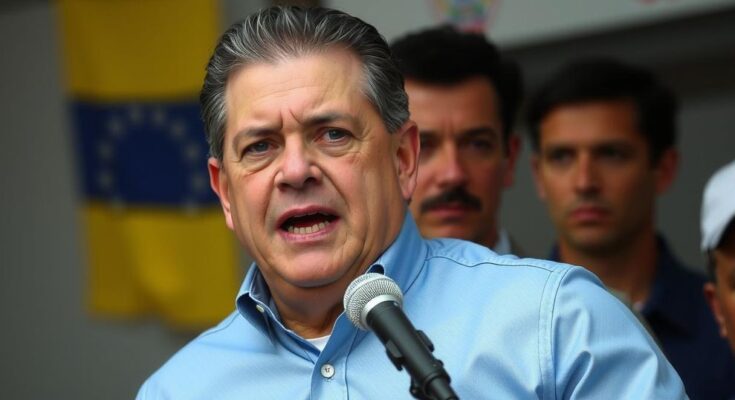Edmundo González, Venezuelan opposition leader, is seeking international support to validate his claimed election victory against Nicolás Maduro. In Panama, he presented electoral documents purportedly showing his win while meeting with regional leaders, amidst increasing tensions with Maduro’s government. The situation reflects wider regional shifts and the ongoing struggle for democracy in Venezuela.
Edmundo González, a prominent Venezuelan opposition figure residing in exile, has intensified efforts to seek international recognition of his purported victory over Nicolás Maduro in the controversial July presidential election. In a recent visit to Panama, just days prior to Maduro’s inauguration ceremony, González presented documents he claims to be authentic electoral tally sheets indicating his decisive win. Accompanied by several former leaders from Latin America, he met with Panamanian President José Raúl Mulino, where he formally introduced the contested documents. Previously, González has sought support from influential leaders, including U.S. President Joe Biden and those in Argentina and Uruguay.
The significance of González’s claims has gained traction in various regions despite resistance from Maduro’s administration. His visit to Panama marks a new chapter in his diplomatic endeavors since he left Spain. However, specific strategies for achieving his claims remain undisclosed, particularly given the Venezuelan government’s intentions to arrest him and its dominance over critical institutions. Likewise, Colombian President Gustavo Petro, who once maintained cordial relations with Maduro, has publicly declined to attend Maduro’s inauguration, further indicating a shift in support for the opposition amid various human rights abuses reported in Venezuela.
González’s diplomatic tour also included stops in the Dominican Republic, culminating in his planned return to Venezuela to claim the presidency. The opposition maintains that the election results were marred by fraud, citing extensive evidence of electoral malpractice and state repression. Despite severe crackdowns resulting in the arrest of numerous dissenters, the opposition clings to hopes that transparency will emerge, proving González’s claims of victory through grassroots polling station supervision. However, official ballot tallies have yet to be released by the Venezuelan electoral authority, fueling accuser sentiments of a government cover-up.
Panama has positioned itself firmly in favor of González, having been one of the first nations to advocate for a thorough examination of the election results. President Mulino reaffirmed Panama’s support during his recent meeting with González, emphasizing his government’s commitment to legitimate representation in Venezuela. As González prepares for a return fraught with uncertainty, the dynamics between opposition forces and the Maduro regime appear increasingly tense, setting the stage for further political clashes and intensified struggles for power within a crisis that remains unresolved.
The political landscape in Venezuela has been dominated by conflict and controversy following an election that many, including González’s opposition party, deem fraudulent. Nicolás Maduro has faced accusations of human rights abuses and suppression of dissent, which have led to widespread national and international outcry. González’s self-exile reflects the dangers faced by political dissidents as they navigate a politically charged environment fraught with risks posed by the Maduro government. Recent diplomatic shifts, particularly by regional leaders, underscore changing allegiances in Latin America concerning Venezuelan politics.
In summary, Edmundo González’s efforts to validate his presidential victory against Nicolás Maduro have garnered significant attention and international backing, particularly from Panama. With escalating tensions and geopolitical implications, González’s impending return to Venezuela is poised to spark a significant confrontation. The situation underscores not only the internal struggle within Venezuela but also the broader regional dynamics influencing democratic legitimacy and governance in Latin America.
Original Source: www.newsweek.com




